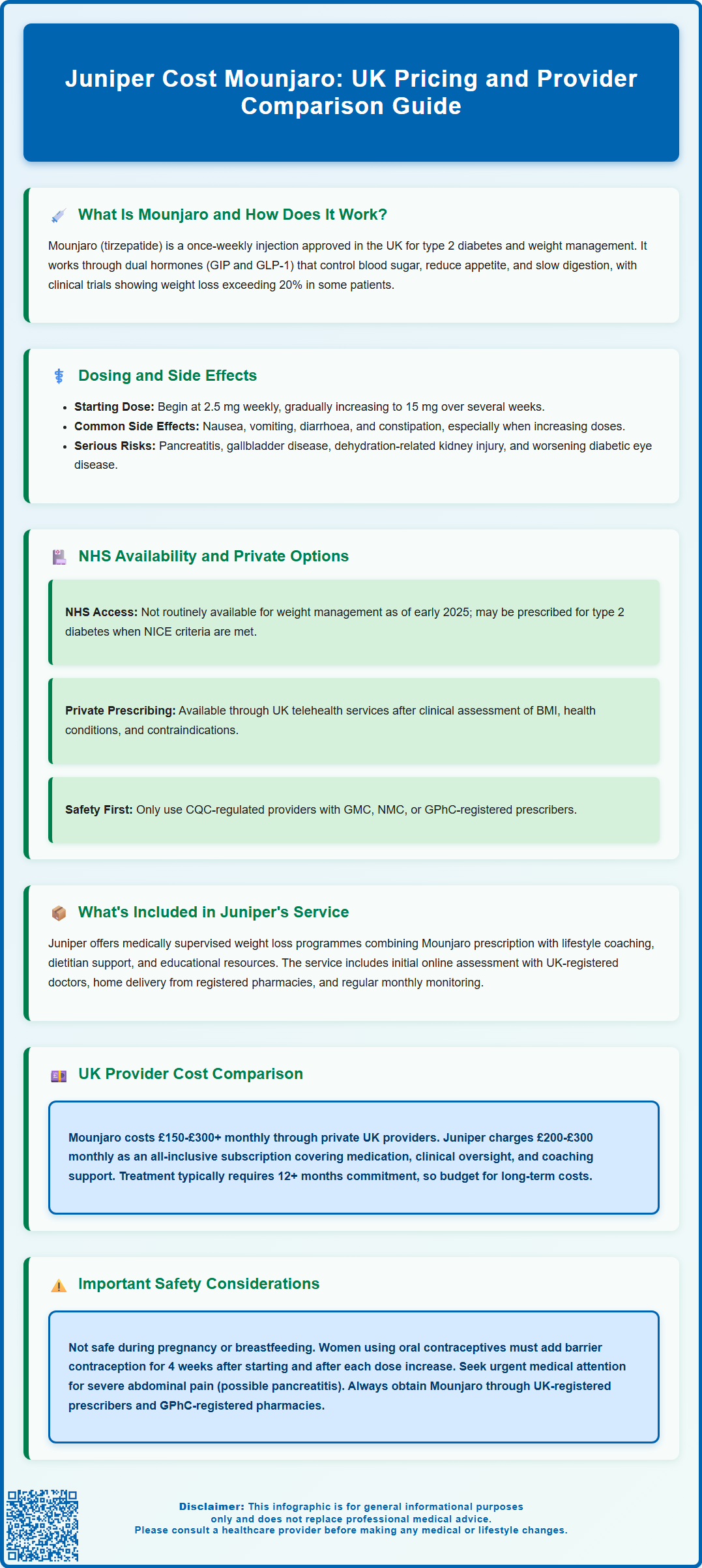Mounjaro (tirzepatide) has emerged as a significant treatment option for weight management and type 2 diabetes in the UK, but accessing it privately through services like Juniper involves considerable cost. Understanding Juniper's pricing structure for Mounjaro, what's included in their service, and how costs compare across UK providers is essential for patients considering this medication. This article examines the financial aspects of obtaining Mounjaro through Juniper, explores NHS availability, and provides guidance on comparing private prescription options whilst ensuring safe, regulated access to this dual GIP/GLP-1 receptor agonist medication.
Summary: Juniper's Mounjaro service typically costs £200–£300 monthly, including medication, clinical monitoring, and lifestyle coaching support.
- Mounjaro (tirzepatide) is a dual GIP/GLP-1 receptor agonist administered as a once-weekly subcutaneous injection for type 2 diabetes and weight management.
- The medication is not routinely available on the NHS for weight management as of early 2025, making private prescription the primary access route.
- Private Mounjaro costs across UK providers range from approximately £150–£300+ monthly depending on dose, consultations, and support services included.
- Patients must use CQC-registered providers with GMC/NMC/GPhC-registered prescribers and UK-registered pharmacies to ensure medication safety and quality.
- Common side effects include gastrointestinal symptoms; patients should seek urgent medical attention for severe abdominal pain suggesting pancreatitis.
- Women of childbearing potential require effective contraception during treatment and for at least one month after stopping Mounjaro.
Table of Contents
What Is Mounjaro and How Does It Work?
Mounjaro (tirzepatide) is a prescription medicine licensed in the UK for the treatment of type 2 diabetes and, more recently, for weight management in adults with obesity or overweight with weight-related health conditions. It belongs to a novel class of medications known as dual glucose-dependent insulinotropic polypeptide (GIP) and glucagon-like peptide-1 (GLP-1) receptor agonists. This dual mechanism distinguishes Mounjaro from other GLP-1 receptor agonists such as semaglutide (Wegovy, Ozempic).
The medication works by mimicking two naturally occurring hormones in the body. GLP-1 stimulates insulin secretion when blood glucose levels are elevated, suppresses glucagon release (which reduces glucose production by the liver), slows gastric emptying, and promotes satiety. GIP also enhances insulin secretion and may influence fat metabolism and energy balance. Together, these actions help regulate blood sugar levels in people with type 2 diabetes and support weight loss by reducing appetite and caloric intake.
Mounjaro is administered as a once-weekly subcutaneous injection using a pre-filled pen. The dose is gradually increased over several weeks to minimise gastrointestinal side effects, starting at 2.5 mg (an initiation dose not intended for long-term glycaemic control) and potentially escalating to a maximum of 15 mg weekly, with increases typically made in 2.5 mg increments every 4 weeks depending on individual response and tolerability. Clinical trials have demonstrated significant reductions in HbA1c (a marker of long-term blood glucose control) and substantial weight loss, with some participants losing over 20% of their body weight.
Common side effects include nausea, vomiting, diarrhoea, constipation, and reduced appetite, particularly during dose escalation. Patients should be aware of the risk of hypoglycaemia (low blood sugar) when Mounjaro is used with insulin or sulfonylureas, which may require dose reduction of these medications. Due to delayed gastric emptying, women using oral contraceptives should use additional barrier contraception for 4 weeks after starting Mounjaro and after each dose increase.
Patients should stop taking Mounjaro and seek urgent medical attention if they develop symptoms of pancreatitis (severe abdominal pain). Other important safety considerations include risks of gallbladder disease, dehydration leading to acute kidney injury with severe gastrointestinal symptoms, and potential worsening of diabetic retinopathy with rapid improvement in blood glucose control.
Mounjaro should not be used during pregnancy or breastfeeding. Women of childbearing potential should use effective contraception during treatment and for at least 1 month after stopping. Caution is advised in patients with a personal or family history of thyroid disease, including medullary thyroid carcinoma or multiple endocrine neoplasia syndrome type 2.
Suspected side effects should be reported via the MHRA Yellow Card scheme (yellowcard.mhra.gov.uk).

NHS Availability and Private Prescription Options
As of early 2025, Mounjaro is not routinely available on the NHS for weight management, although it is licensed for this indication by the Medicines and Healthcare products Regulatory Agency (MHRA). The National Institute for Health and Care Excellence (NICE) has issued guidance on tirzepatide for type 2 diabetes (TA924), recommending it as an option in specific circumstances, but guidance for obesity treatment remains under evaluation. NHS England has indicated that widespread provision for weight management will depend on cost-effectiveness assessments, supply considerations, and integration into specialist weight management services.
For type 2 diabetes, Mounjaro may be prescribed on the NHS where NICE criteria are met, typically after other treatments have been tried. In England, NHS organisations are legally required to fund treatments recommended in NICE Technology Appraisals within 90 days of publication, although current supply constraints may affect availability. Access may differ across the devolved nations (Scotland, Wales, and Northern Ireland) where separate commissioning arrangements exist. Integrated Care Boards (ICBs) in England are responsible for local implementation of NICE guidance.
Private prescribing of Mounjaro has grown significantly, with several UK-based telehealth and weight management services offering consultations and prescriptions. These services typically require an initial clinical assessment (often conducted online via questionnaire and video consultation) to determine eligibility. Prescribers assess body mass index (BMI), weight-related comorbidities (such as hypertension, type 2 diabetes, or obstructive sleep apnoea), previous weight loss attempts, and contraindications.
It is essential that patients use regulated providers registered with the Care Quality Commission (CQC) in England or equivalent bodies in other UK nations. Prescribers must be registered healthcare professionals (doctors with General Medical Council registration, nurse prescribers registered with the Nursing and Midwifery Council, or pharmacist prescribers registered with the General Pharmaceutical Council) operating within their scope of practice. Patients should be wary of unregulated online pharmacies or suppliers offering Mounjaro without proper clinical oversight, as this poses significant safety risks.
What's Included in Juniper's Mounjaro Service
Juniper is a UK-based digital health platform specialising in weight management programmes that include access to prescription medications such as Mounjaro. The service provides clinically supervised weight loss support combining medication with lifestyle coaching and ongoing monitoring. Juniper operates as a private healthcare provider, meaning patients pay out-of-pocket for consultations, medication, and programme support.
The Juniper Mounjaro programme typically includes:
-
Initial clinical assessment: A detailed online consultation with a UK-registered clinician (doctor or prescriber) to evaluate eligibility, review medical history, assess BMI and comorbidities, and discuss treatment goals.
-
Prescription and medication supply: If deemed suitable, a prescription for Mounjaro is issued and the medication is dispensed by a registered UK pharmacy and delivered directly to the patient's home.
-
Ongoing clinical monitoring: Regular check-ins (usually monthly) with healthcare professionals to monitor progress, manage side effects, adjust dosing, and ensure safe continuation of treatment.
-
Lifestyle coaching and support: Access to health coaches, HCPC-registered dietitians, or wellness advisors who provide guidance on nutrition, physical activity, behavioural change, and sustainable weight management strategies.
-
Educational resources: Digital content, meal plans, exercise recommendations, and tools to support long-term lifestyle modification.
Juniper's approach combines medication with lifestyle interventions, recognising that sustainable weight loss requires addressing dietary habits, physical activity, sleep, and psychological factors. The service is subscription-based, with monthly fees covering medication, consultations, and support. Patients are typically required to commit to a minimum programme duration (often three to six months).
Eligibility criteria generally align with clinical guidelines: BMI ≥30 kg/m² (or ≥27 kg/m² with weight-related comorbidities). Important safety considerations include:
-
Mounjaro should not be used during pregnancy or breastfeeding
-
Women using oral contraceptives should use additional barrier contraception for 4 weeks after starting and after each dose increase
-
Caution is advised in patients with thyroid disease history
-
Risk of hypoglycaemia when used with insulin or sulfonylureas
-
Patients should stop taking Mounjaro and seek urgent medical attention if they develop symptoms of pancreatitis
-
Risks of gallbladder disease and dehydration leading to kidney problems with severe gastrointestinal side effects
Patients should disclose all current medications to avoid potential interactions and ensure they receive Mounjaro from a UK-registered pharmacy to avoid counterfeit or compounded products.
Comparing Mounjaro Costs Across UK Providers
The cost of Mounjaro in the UK varies significantly depending on the provider, dosage, and whether additional services (consultations, coaching) are included. As a private prescription medication, prices are not regulated, and patients should compare offerings carefully. The following information reflects pricing as of early 2025, but costs may fluctuate due to supply and demand factors.
Typical monthly costs for Mounjaro through private providers range from approximately £150 to £300+, depending on dose and service model. Lower doses (2.5 mg, 5 mg) are generally less expensive than higher maintenance doses (10 mg, 15 mg). Some providers charge separately for consultations (£30–£100 per appointment) and medication, while others bundle these into a single monthly subscription fee.
Juniper's pricing typically ranges from £200 to £300 monthly, inclusive of medication, clinical oversight, and coaching support. This reflects the comprehensive nature of the service that includes both medication and support elements.
Other UK providers offering Mounjaro include:
-
Boots Online Doctor: Consultation fees plus medication costs; pricing varies by dose.
-
Superdrug Online Doctor: Similar model with separate consultation and medication charges.
-
Specialist weight management clinics: Often higher monthly costs (£300–£500+) but may offer face-to-face consultations and multidisciplinary team input.
-
Independent online pharmacies: May offer medication supply at lower costs (£150–£200) but with varying levels of clinical support.
When comparing costs, patients should consider:
-
What's included: Is ongoing monitoring, dose adjustment, and lifestyle support provided, or just medication supply?
-
Prescriber qualifications: Are consultations with appropriately registered healthcare professionals (GMC, NMC, GPhC)?
-
Regulatory status: Is the provider CQC-registered and using GPhC-registered UK pharmacies?
-
Cancellation policies: Can you pause or stop treatment without penalty?
Financial considerations are important, as Mounjaro treatment for weight management is typically long-term (12+ months). Patients should budget for ongoing costs and be aware that dose changes over time will affect costs. Clinician-led decisions about dose titration and maintenance strategies should be based on medical considerations rather than cost factors alone.
Patients should not assume private health insurance will cover Mounjaro for weight management without explicitly checking policy terms. Regardless of cost considerations, patients should ensure they receive Mounjaro through UK-registered prescribers and GPhC-registered pharmacies to maintain safety and quality standards.
Frequently Asked Questions
How much does Mounjaro cost through Juniper in the UK?
Juniper's Mounjaro service typically costs £200–£300 monthly, which includes the medication, ongoing clinical monitoring, and lifestyle coaching support. Costs vary depending on the prescribed dose and programme duration.
Is Mounjaro available on the NHS for weight management?
As of early 2025, Mounjaro is not routinely available on the NHS for weight management, although it is licensed for this indication. NICE guidance for obesity treatment remains under evaluation, and widespread NHS provision depends on cost-effectiveness assessments and supply considerations.
What should I look for when choosing a private Mounjaro provider?
Ensure the provider is CQC-registered with prescribers registered with the GMC, NMC, or GPhC, and uses UK-registered pharmacies. Compare what's included in the service (consultations, monitoring, support), check cancellation policies, and verify regulatory compliance to ensure safe, quality medication supply.
The health-related content published on this site is based on credible scientific sources and is periodically reviewed to ensure accuracy and relevance. Although we aim to reflect the most current medical knowledge, the material is meant for general education and awareness only.
The information on this site is not a substitute for professional medical advice. For any health concerns, please speak with a qualified medical professional. By using this information, you acknowledge responsibility for any decisions made and understand we are not liable for any consequences that may result.
Heading 1
Heading 2
Heading 3
Heading 4
Heading 5
Heading 6
Lorem ipsum dolor sit amet, consectetur adipiscing elit, sed do eiusmod tempor incididunt ut labore et dolore magna aliqua. Ut enim ad minim veniam, quis nostrud exercitation ullamco laboris nisi ut aliquip ex ea commodo consequat. Duis aute irure dolor in reprehenderit in voluptate velit esse cillum dolore eu fugiat nulla pariatur.
Block quote
Ordered list
- Item 1
- Item 2
- Item 3
Unordered list
- Item A
- Item B
- Item C
Bold text
Emphasis
Superscript
Subscript












